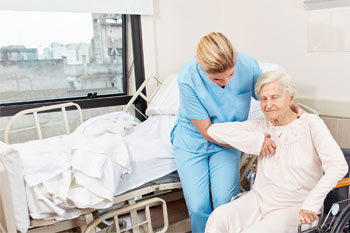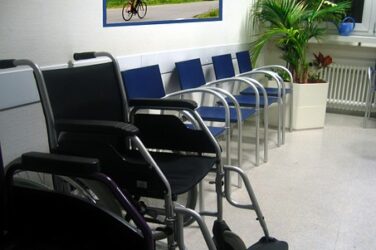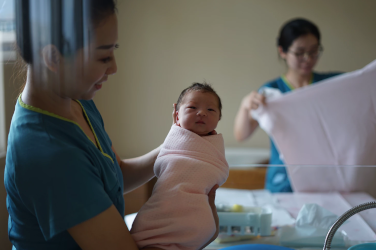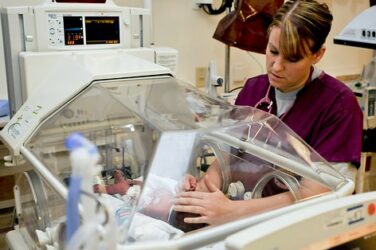Nursing Courses – Routes and Requirements

There are a number of different nursing routes available when becoming a registered nurse. These are: Children’s and General Nursing (Integrated), General Nursing, Intellectual Disability Nursing, Midwifery, and Psychiatric Nursing. An Bord Altranais (the Nursing Board) is the statutory regulatory body for the nursing/midwifery profession in Ireland and it is this board that is responsible for registration of those who have successfully completed a recognised educational nursing programme.
The World Health Organisation states: The mission of nursing in society is to help individuals, families and groups to determine and achieve physical, mental and social potential. An Bord Altranais considers that the following values should underpin nursing practice: respect towards the uniqueness and dignity of each client regardless of culture and religion, trust, understanding and compassion.
There are 43 nursing/midwifery programmes in total, with over 1500 places available at pre-registration level. A number of places are reserved for mature applications and further education applicants. Each nursing/midwifery programme has two identifying course codes: Standard Code (for applicants applying based on their examination results) and a Mature Code (for applicants who are 23 years of age or over, and who wish to be to be considered for a place on grounds of mature years rather than examination results). Application is made through the CAO for both Codes.
Throughout the nursing programme, the student receives a combination of theoretical and clinical instruction. The first clinical placement occurs early in the programme, usually within three months of commencement. The theoretical component of the honours degree programmes consists of: 67% focuses on the art and science of nursing care, and 33% of the theoretical content, is devoted to the applied biological and social sciences; which are the science subjects that are taught as they apply to and inform nursing care.
Childrens and General Nursing (Integrated)
| BSc Children’s and General Integrated | RGN/RCN | Dublin City University |
| BSc Children’s/General Integrated | RGN/RCN | Trinity College Dublin |
| BSc Children’s and General Nursing | RGN/RCN | University College Dublin |
| BSc Integrated Children’s and General | RGN/RCN | University College Cork |
General Nursing
| BSc (Hons) in Nursing in General Nursing | RGN | Athlone Institute of Technology |
| BSc in Nursing (General) | RGN | Dublin City University |
| BSc (Hons) General Nursing | RGN | Dundalk Institute of Technology |
| BSc (Hons) General Nursing | RGN | Galway Mayo Institute of Technology |
| BSc (Hons) General Nursing | RGN | Institute of Technology Tralee |
| BSc (Hons) General Nursing | RGN | Letterkenny Institute of Technology |
| BSc (Hons) General Nursing | RGN | National University of Ireland Galway |
| BSc Nursing Science General | RGN | St. Angela’s College Sligo |
| BSc General Nursing | RGN | Trinity College Dublin |
| BSc General Nursing | RGN | University College Cork |
| BSc General | RGN | University College Dublin |
| BSc General Nursing | RGN | University of Limerick |
| BSc (Hons) General Nursing | RGN | Waterford Institute of Technology |
Intellectual Disability Nursing
| BSc in Nursing (Intellectual Disability) | RNID | Dublin City University |
| BSc (Hons) Intellectual Nursing | RNID | Dundalk Institute of Technology |
| BSc (Hons) Intellectual Disability Nursing | RNID | Letterkenny Institute of Technology |
| BSc Nursing Science Intellectual Disability | RNID | St. Angela’s College Sligo |
| BSc Intellectual Disability Nursing | RNID | Trinity College Dublin |
| BSc Intellectual Disability | RNID | University College Cork |
| BSc Intellectual Disability | RNID | University of Limerick |
| BSc (Hons) Intellectual Disability Nursing | RNID | Waterford Institute of Technology |
Psychiatric Nursing
| BSc (Hons) in Nursing in Psychiatric Nursing | RPN | Athlone Institute of Technology |
| BSc in Nursing (Pyschiatric) | RPN | Dublin City University |
| BSc (Hons) Psychiatric Nursing | RPN | Dundalk Institute of Technology |
| BSc (Hons) Psychiatric Nursing | RPN | Galway Mayo Institute of Technology |
| BSc (Hons) Mental Health Nursing | RPN | Institute of Technology Tralee |
| BSc (Hons) Psychiatric Nursing | RPN | Letterkenny Institute of Technology |
| BSc Nursing Science Psychiatric | RPN | National University of Ireland Galway |
| BSc Mental Health Nursing | RPN | Trinity College Dublin |
| BSc Psychiatric Nursing | RPN | University College Cork |
| BSc Psychiatric Nursing | RPN | University College Dublin |
| BSc Mental Health | RPN | University of Limerick |
| BSc (Hons) Psychiatric Nursing | RPN | Waterford Institute of Technology |
Midwifery
| BSc (Hons) Midwifery | RM | Dundalk Institute of Technology |
| BSc Midwifery Science | RM | National University of Ireland Galway |
| BSc Midwifery | RM | Trinity College Dublin |
| BSc Midwifery | RM | University College Cork |
| BSc Midwifery | RM | University College Dublin |
| BSc Midwifery | RM | University of Limerick |
RGN = Registered General Nurse
RCN = Registered Children’s Nurse
RNID = Registered Nurse in Intellectual Disability
RPN = Registered Psychiatric Nurse
RM = Registered Midwife
Entry Requirements:
There are minimum entry requirements which usually include: C3 in two higher papers and a minimum grade of D3 in four other papers (honours or ordinary). A Laboratory Science subject must be one of these subjects, along with English or Irish and Maths. Individual Higher Education Institutes might have other specific requirements so it is important to consult with them.
Most of the HEIs offering degree programmes in nursing/midwifery consider specific QQI qualifications as an equivalent entry route for standard code applications. In other words, your QQI qualification is converted into points to compete with other examination students. The best 8 modules are considered for scoring purposes.
QQI Level 5 courses considered for entry include:
– DCHSN Nursing Studies
– DCHSX Community and Health Services
– DHSXX Healthcare Support
(Please note that distinctions will be required in certain modules for entry purposes.)
Mature applicants who pass the written assessment (for mature applicants only) are placed on the list for each mature course code for which he/she has applied. The overall score for the written assessment determines their position on the order of merit list for the courses they have applied for. The written assessment has four separate sections: skills/experience questionnaire, a verbal test, numerical test, and a job simulation exercise.
Further Studies: After the completion of a pre-registered programme in nursing/midwifery, graduates might wish to pursue further education in the sector. Many such opportunities are available, and An Bord Altranais has approved a number of specialist programmes. They include: Children’s Nursing, Midwifery, Nurse Tutor, Public Health Nursing, Nurse Prescriber, Advanced Nurse Practitioner and Advanced Midwife Practitioner.
Sample Courses
Certificate in Nursing Studies from Portobello Institute. This course is designed as a programme of preparatory study to enter a degree programme in Nursing Studies. Students undertaking this course can apply for a training position in General Nursing, Psychiatric Nursing, Intellectual Disability Nursing and Children’s Nursing. The course introduces the Student to the caring role of the nurse and emphasises the importance of interpersonal communication. The course equips students with the skills and knowledge to care for patients in a safe and hygienic environment. Students learn the basic principles of infection control and are taught to apply standard precautions in relation to infection control. They learn the structure and function of the human body and gain an understanding of the interrelationship between the systems of the body. They study the levels of personal development to understand the concepts of mental age and chronological age in order to be able to relate to people at a level appropriate to their needs. This course qualifies students to work as a care assistant in the areas such as: Nursing homes and Hospitals.
For Mature Code applicants, the Written Assessment Test for nursing is competitive. Kilroy’s College offer a home study course to learn the skills you need to be successful in the competitive written test.
Galway-Mayo Institute of Technology offer CAO applicants a General Nursing programme. This degree will help you understand the needs of people who are in the care of nurses. It will also give you a sense of how nursing works, as well as the personal and professional qualities that are associated with effective nursing practice. You will learn why people are nursed in particular ways and how to deliver the nursing care that is required. Your academic learning and practical learning will go hand in hand and you will be encouraged to reflect on your experiences as you progress through the course. First year Modules include: Biological and Related Sciences, Social Sciences, Fundamental Nursing Practice, Personal and Professional Development, Health Promotion & Research Studies, Clinical Practice Placement and Computer Applications.
The B.Sc. Nursing (General) is a full-time four year degree programme offered by the Department of Nursing and Midwifery, University of Limerick in conjunction with the Health Service Executive West (Limerick, Clare and North Tipperary). On successful completion of the programme students will be able to present for registration with An Bord Altranais and practise as a Registered General Nurse (R.G.N.). The course is designed to equip students with the knowledge, skills, and attitudes required to become confident, analytical and reflective practitioners who are able to make maximum use of resources including research in their day to day practice. The overall aim of the programme is to facilitate the development of an individual who is able to practice nursing based on a sound knowledge and understanding of factors affecting the health and wellbeing of those who require care. This knowledge will be acquired through the study of nursing, biological sciences, social sciences and related disciplines.
Children’s and General Nursing (Integrated) from UCC is a four and a half year programme. The School of Nursing and Midwifery in Cork promotes personal, professional and academic development through the provision of college and practice-based learning. The aim of the programme is to foster the development of knowledge, skills, attitudes and professional values applicable to nursing children and adults. Like all relevant HEI courses, on successful completion, a graduate is eligible to apply for a professional registration in children‚ as well as general nursing (RGN, RCN) with An Bord Altranais along with being awarded an NUI degree (if applicable).
Many of the nursing course literature emphasises the need for future Nurses to be caring individuals, who feel that they can contribute to the well-being of others with intelligence and enthusiasm. Regardless of points, if you don’t have the essential human characteristics required to be a nurse, it is futile to apply. If you do have them, you will do well in nursing.
It is a profession that calls for both intelligence and empathy; the latter being the ability to understand what another person is going through, and the ability to respond appropriately. Being empathetic makes a patient feel cared for and understood; it essentially defines this profession.
Find more info on health care and nursing courses by browsing some Medical and Healthcare Course Listings on Findacourse.ie





